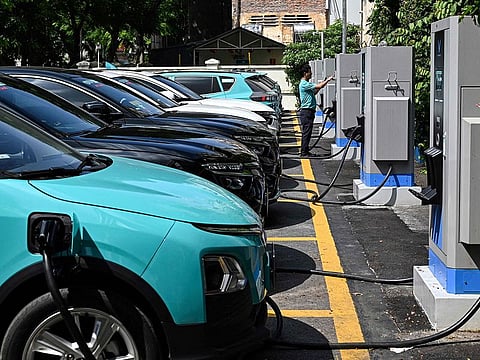Central Bank of UAE: Electric vehicle repairs hurt insurance pricing
Insurance companies allowed to offer up to 25% discounts in the UAE

Dubai: The Central Bank of the UAE (CBUAE) has confirmed that electric vehicles (EVs) face several technical challenges that directly impact how their insurance is priced.
Key issues include high repair costs, limited spare parts availability, shortage of service centres, increased accident-related claims, and a lack of long-term performance data.
In a written reply to the Federal National Council (FNC), responding to a question submitted by Council member Dr. Adnan Hamad Al Hammadi on regulating vehicle insurance pricing, the CBUAE clarified that insurance companies are allowed to offer discounts of up to 25% from the minimum pricing threshold for electric or natural gas-powered vehicles, depending on the vehicle’s accident history.
Unified policy system
The Bank added that it monitors vehicle insurance pricing through a unified policy system. This framework sets minimum and maximum price limits, standardises coverage, and ensures transparency in pricing to prevent misuse or overcharging.
It also pointed out that global supply chain delays have negatively affected both the speed and cost of EV maintenance. The Central Bank emphasised that its main goal is to ensure fair and sustainable insurance coverage for all policyholders while maintaining the technical and financial stability of the insurance sector and supporting the nation’s shift toward clean energy alternatives.
Refusing repairs for showroom-bought EVs
Separately, the UAE Insurance Federation revealed that some authorised EV agencies are refusing to repair or replace parts for electric vehicles that were purchased through dealerships rather than directly from the agencies themselves — a practice that the Federation says negatively affects insurers.
Mohammed Mazhar Hammadeh, Vice Chairman of the Supreme Technical Committee and Chairman of the Motor Committee at the UAE Insurance Federation, told Gulf News:
“Car insurance prices have now reached a balanced point in the market. Most insurers are offering fair pricing for both the customer — who benefits from quality service — and the insurer, who charges a rate that reflects actual repair costs.”
However, he flagged an urgent issue: some authorised EV agencies — especially those representing vehicles manufactured in Asia — are declining repair or spare part services unless the vehicle was bought directly from them, not from licensed car showrooms.
He explained that these showrooms operate legally in the UAE and often offer EVs at lower prices than official agencies, making them attractive to consumers. Hammadeh stressed that it is unacceptable for agencies to refuse repairs or parts simply because the car was purchased from a showroom, especially when those vehicles are legally sold and insured within the local market.
Complaints mount over agency practices
Hammadeh also highlighted growing complaints from policyholders about certain agency practices — including charging excessive fees just to open a service case, or outright refusing to conduct repairs. Such practices complicate matters for insurers when accidents involve showroom-bought vehicles covered under existing policies.
He noted that some customers have reported significant price differences between agencies and showrooms for the same vehicle brands. “Most Asian-origin vehicles now have authorised agencies in the UAE,” he said, adding that resolving this issue is critical — not just for insurance companies, but also for buyers looking for the best value when purchasing a car.
He warned: “When an agency refuses to repair a vehicle, policyholders blame the insurance company and demand the car be written off — even if repairs cost less than Dh1,000. That’s unreasonable, and it creates financial losses for insurers who are then pressured to declare a total loss.”
Hammadeh concluded by clarifying the role of insurers: “Insurance companies are responsible for covering the cost of spare parts — not for sourcing them. Our job is to provide coverage, not act as a supplier.”



